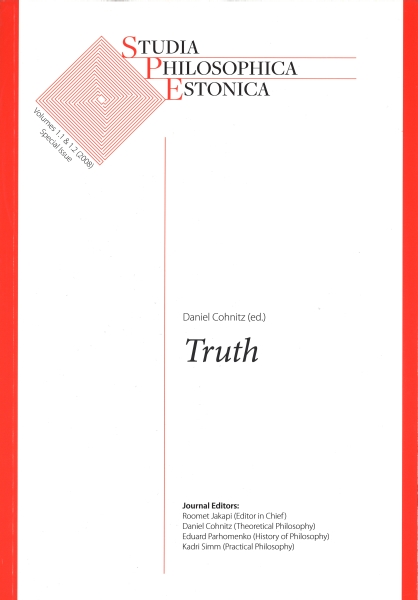Deflationism, Truth-Aptness and Non-Factualism
DOI:
https://doi.org/10.12697/spe.2008.1.1.05Keywords:
deflationism, non-factualism, use conception of meaningAbstract
I will argue that the standard formulation of non-factualism in terms of a denial of truth-aptness is consistent with a version of deflationsim. My line of argument assumes the use conception of meaning. This brings out an interesting consequence since mostly the philosophers who endorse the use conception of meaning, e.g. Paul Horwich, hold that deflationism is inconsistent with the strategy of implementing non-factualism in terms of a denial of truth-aptness and thereby urge a reformulation of non-factualism.
Downloads
References
Boghossian, P. (1990). The status of content, Philosophical Review 99: 157-184.
Carpintero, M. G. (1996). What is a tarskian definition of truth?, Philosophical Studies 82: 113-144.
Davies, M.(1981). Meaning, Quantification, Necessity, Routledge and Kegan, London.
Etchemendy, J. (1988). Tarski on truth and logical consequence, Journal of Symbolic Logic 53: 51-79.
Fodor, J. and Lepore, E. (1991). Why meaning (probably) isn’t conceptual role, Mind and Language 6: 329-343.
Fodor, J. and Lepore, E. (1996). The pet fish and the red herring: Why concepts aren’t prototypes, Cognition 58: 243-276.
Frege, G. (1982). Über Sinn und Bedeutung, Zeitschrift für Philosophie und Philosophische Kritik 100: 22-50.
Horwich, P. (1990). Truth, Blackwell, Oxford.
Horwich, P. (1991). On the nature and norms of theoretical commitment, Philosophy of Science 58: 1-14.
Horwich, P. (1998). Meaning, Clarendon Press, Oxford.
Horwich, P. (2004). A use theory of meaning, Philosophy and Phenomenological Research 68: 351-372.
Horwich, P. (2005). Deflating compositionality, Reflections on Meaning, Clarendon Press, Oxford, pp. 198-221.
Horwich, P. (2006). A world without isms, in P. G. M. P. Lynch (ed.), Truth and Realism, Oxford University Press, Oxford, pp. 188-202.
Kirkham, R. (1995). Theories of Truth, MIT Press, Cambridge, Mass.
Künne, W. (2003). Conceptions of Truth, Clarendon Press, Oxford.
Kripke, S. (1975). Outline of a theory of truth, The Journal of Philosophy 72: 690-716.
Patterson, D. (2002). Theories of truth and convention T, Philosopher’s Imprint 2: 1-16.
Patterson, D. (2003). What is a correspondence theory of truth?, Synthese 137: 421-444.
Putnam, H. (1994). Words and Life, Harvard University Press, Cambridge, Mass, chapter On Truth, pp. 315-329.
Richard, M. (1997). Deflating truth, Philosophical Issues 8: 57-78.
Soames, S. (1984). What is a theory of truth?, The Journal of Philosophy 81: 411-429.
Soames, S.(1997). The truth about deflationism, Philosophical Issues 8:1-44.
Soames, S. (1999). Understanding Truth, Oxford University Press, Oxford.
Wright, C. (1992). Truth and Objectivity, Harvard University Press, Cambridge, Mass.
Wright, C. (1998). Why Frege did not deserve his Granum Salis. A note on the paradox of ‘the concept horse’ and the ascription of bedeutungen to predicates, Grazer Philosophische Studien 55: 239-263.

